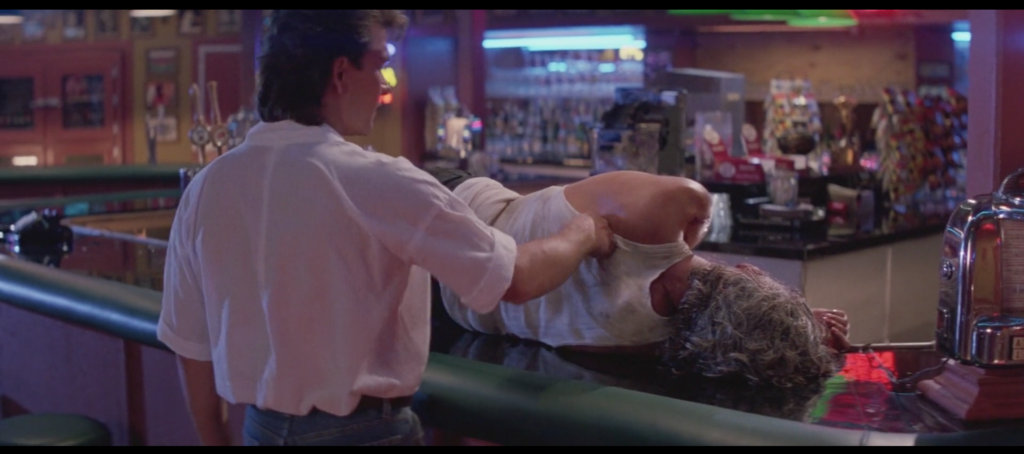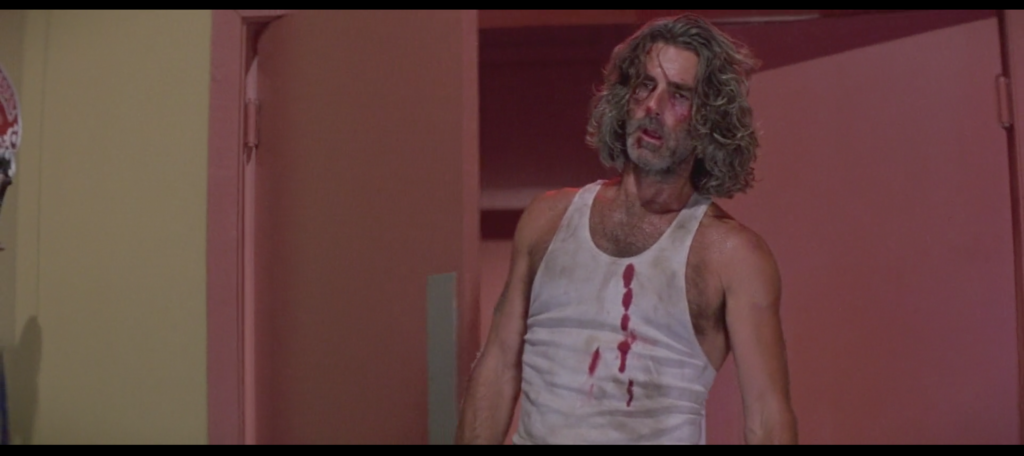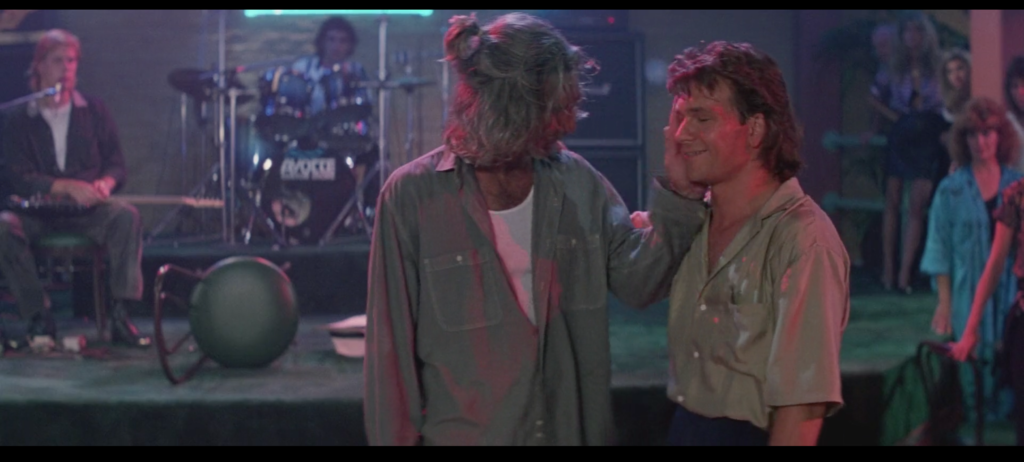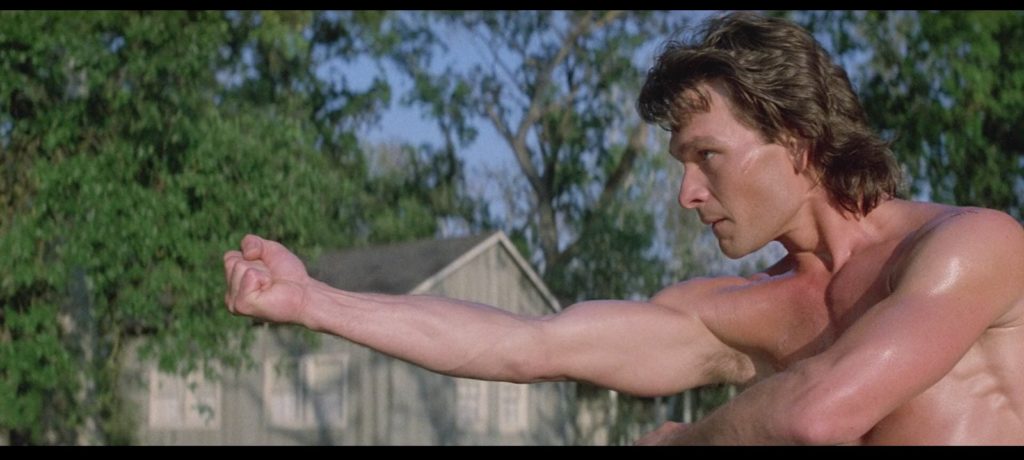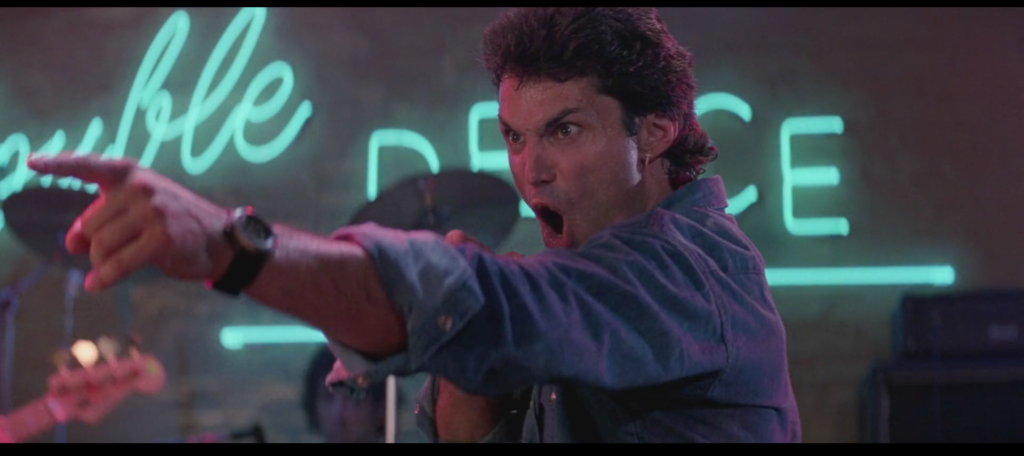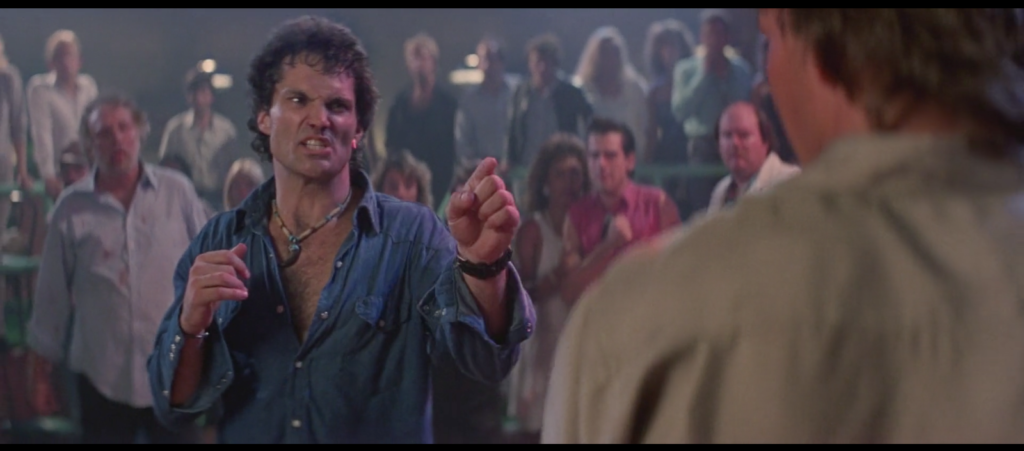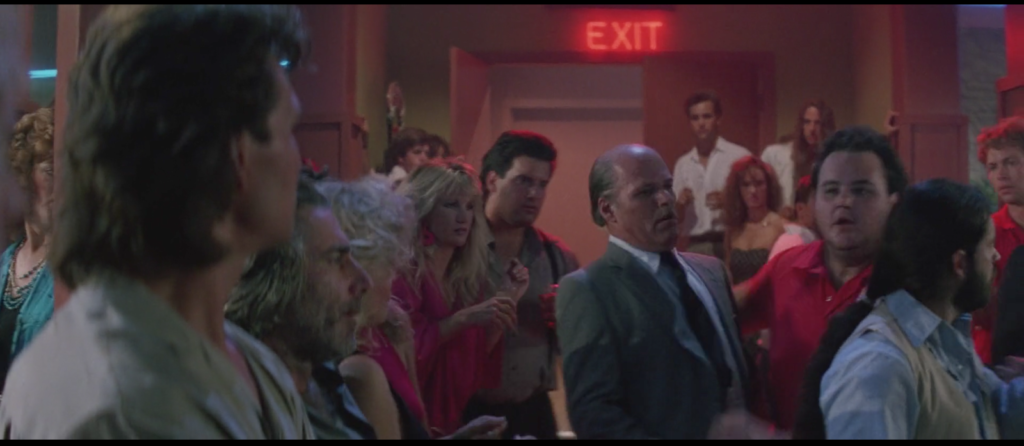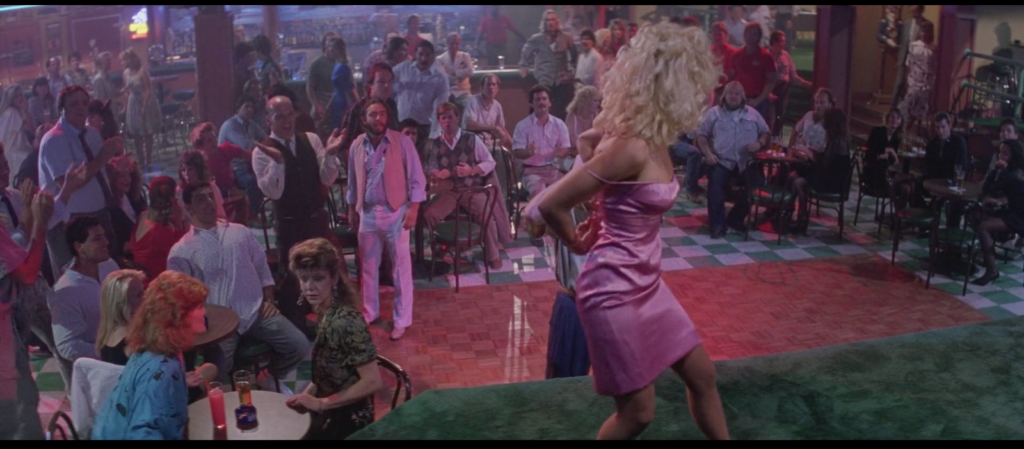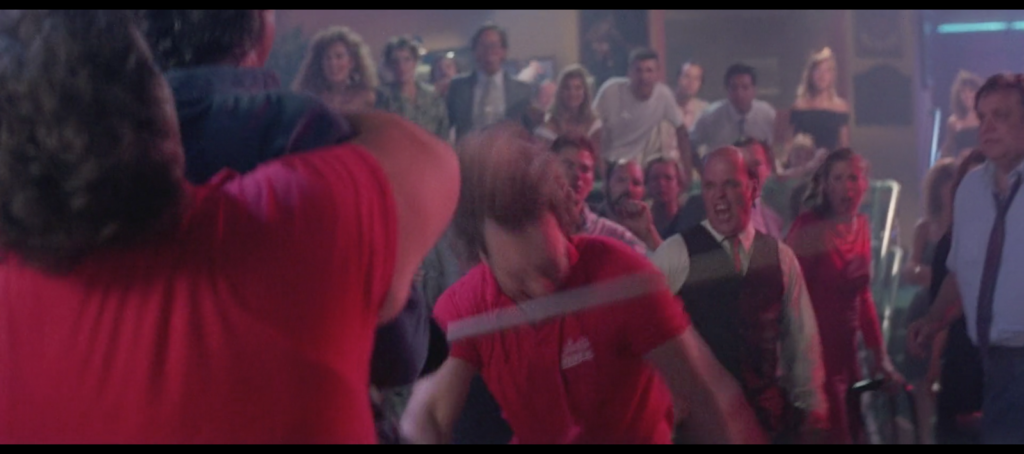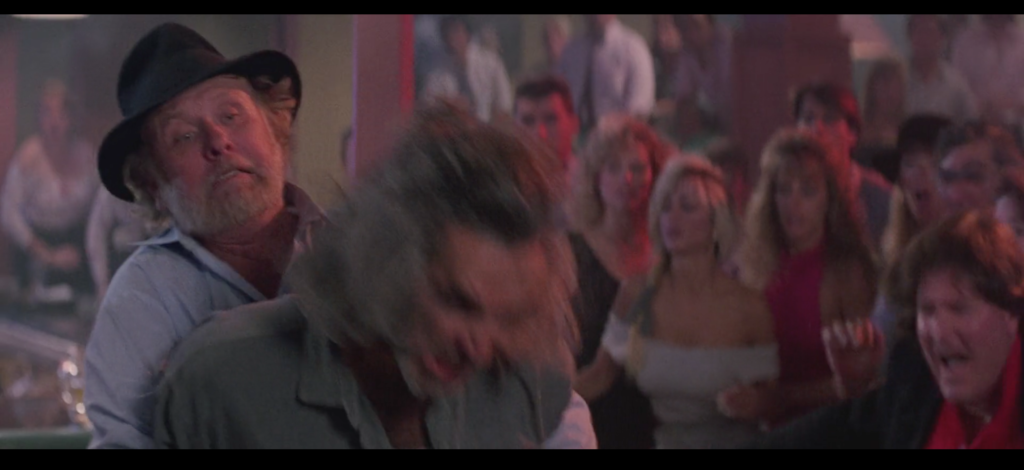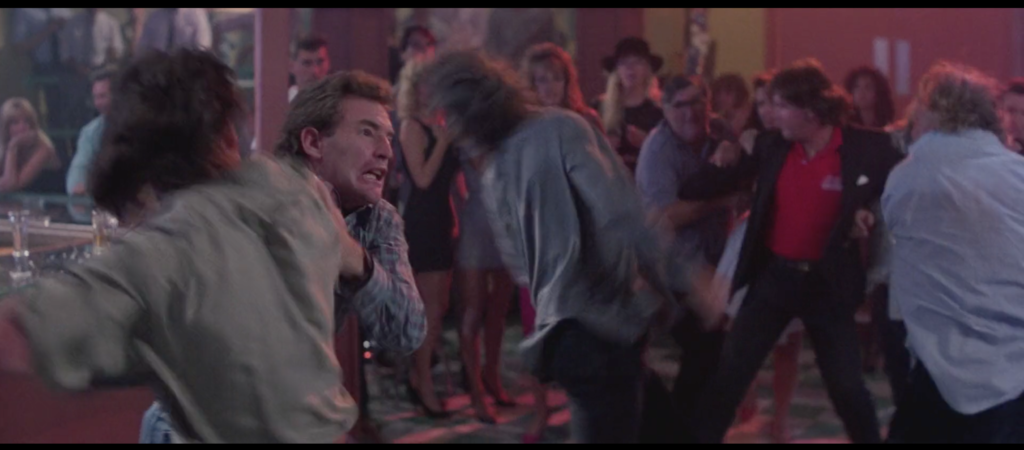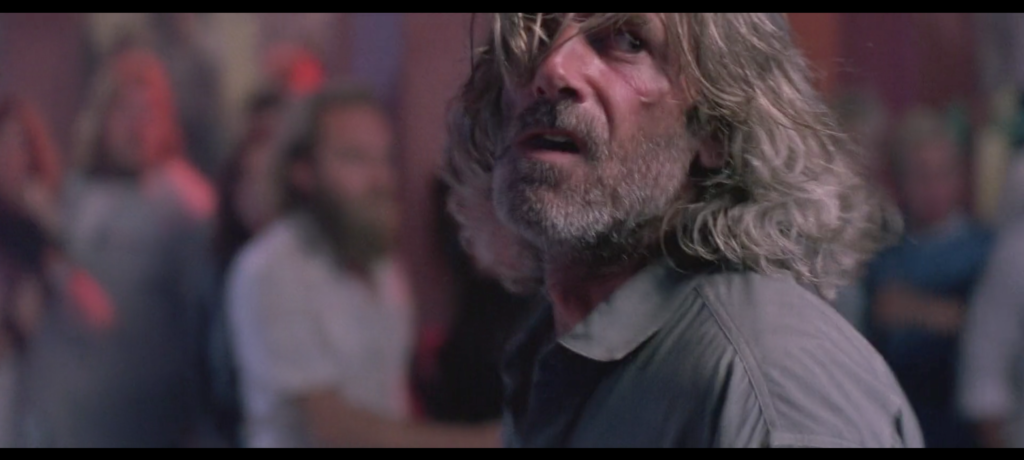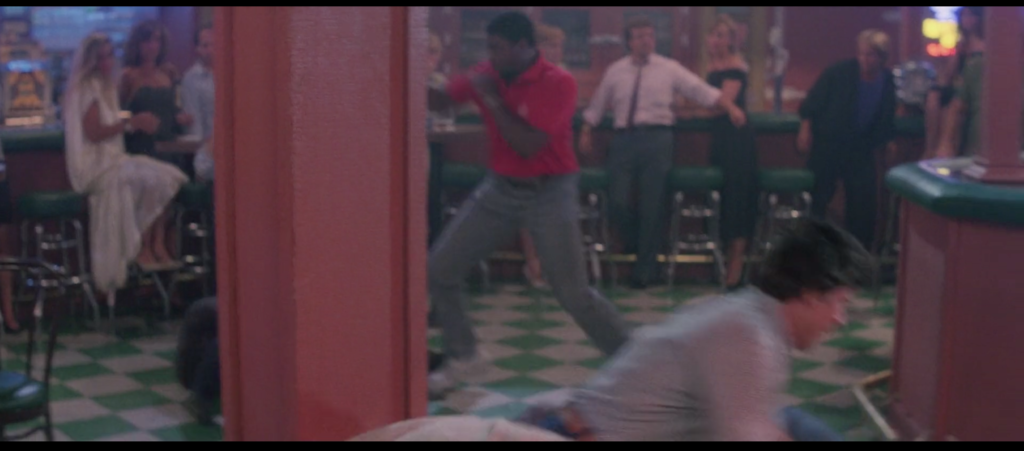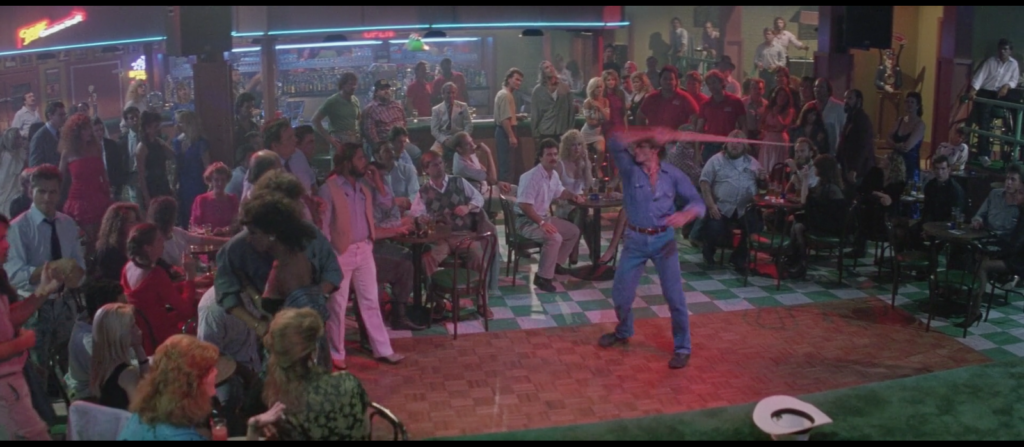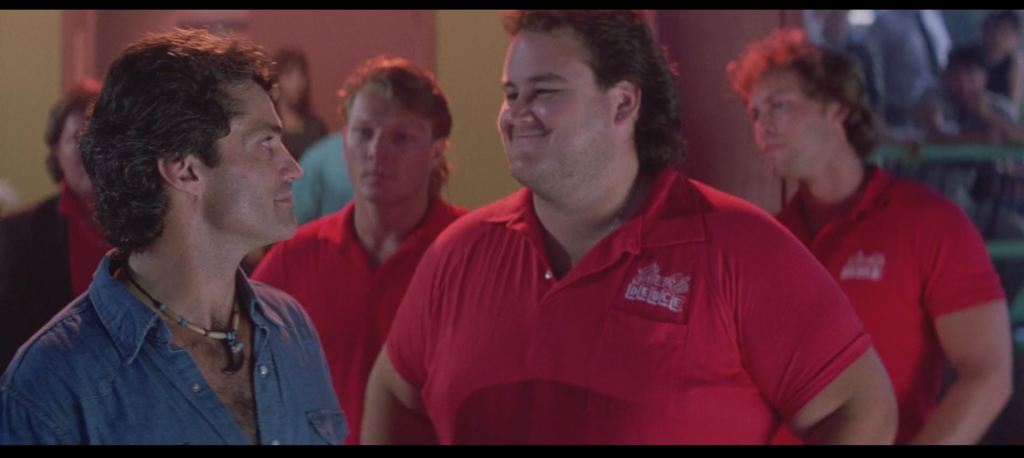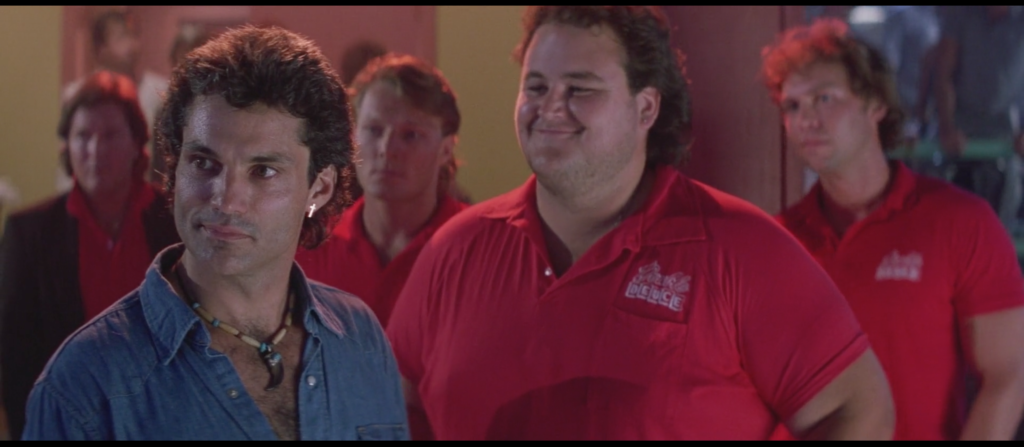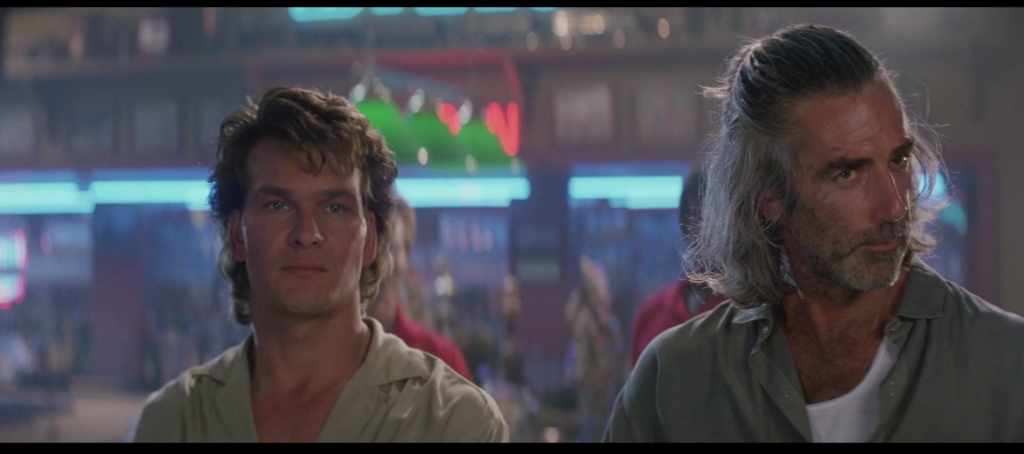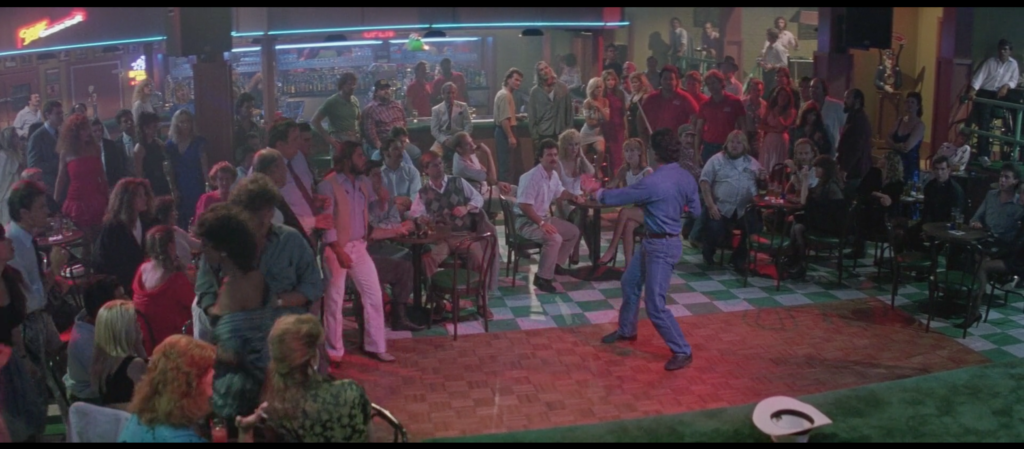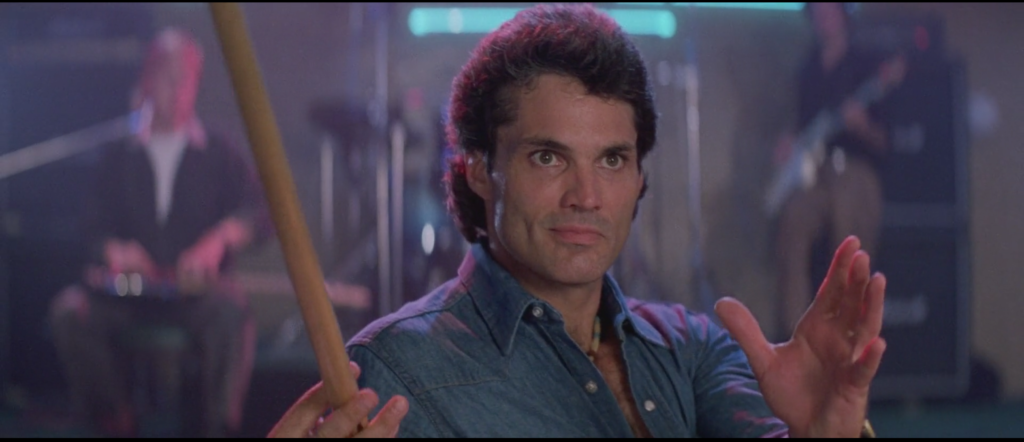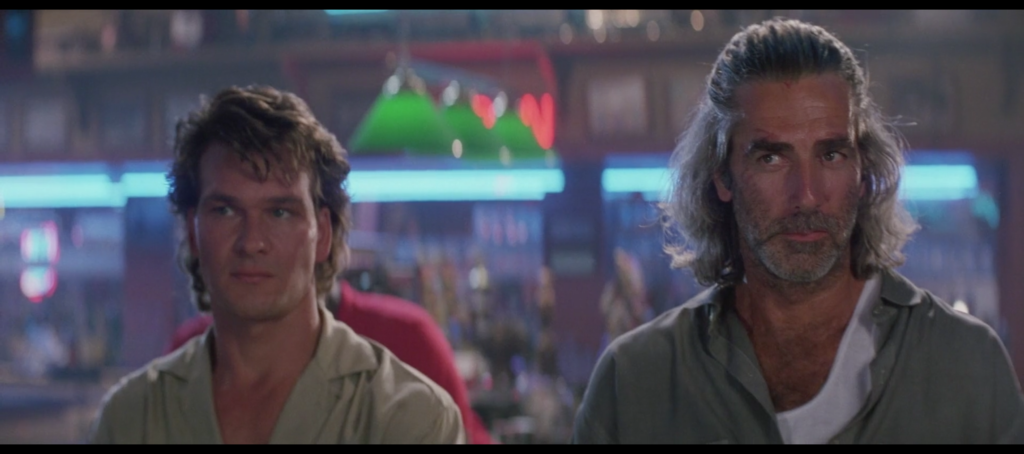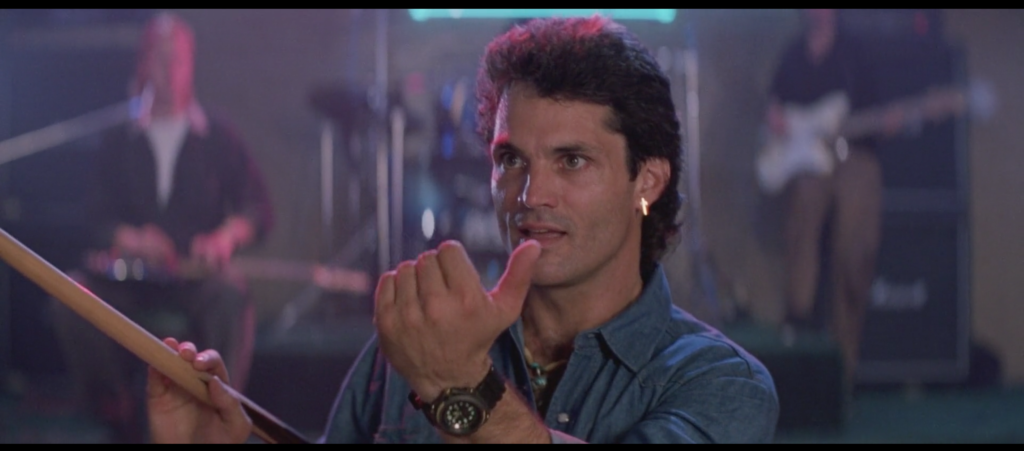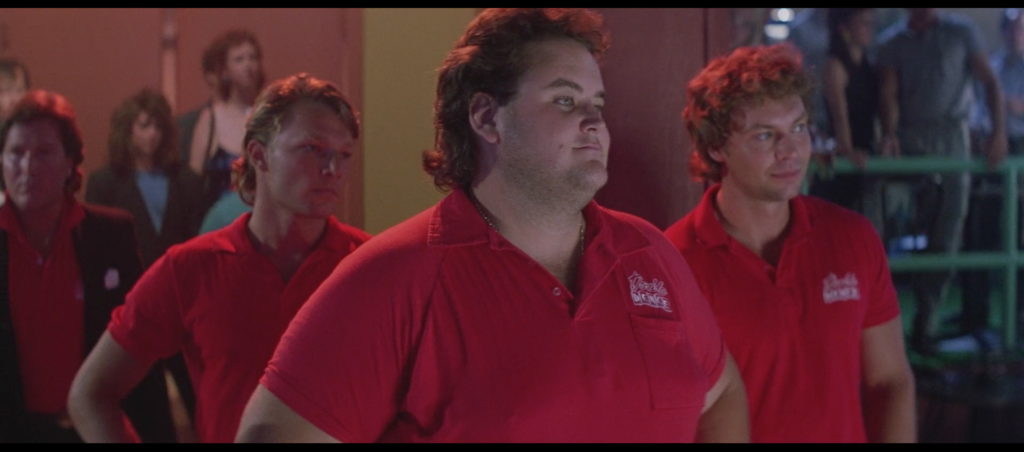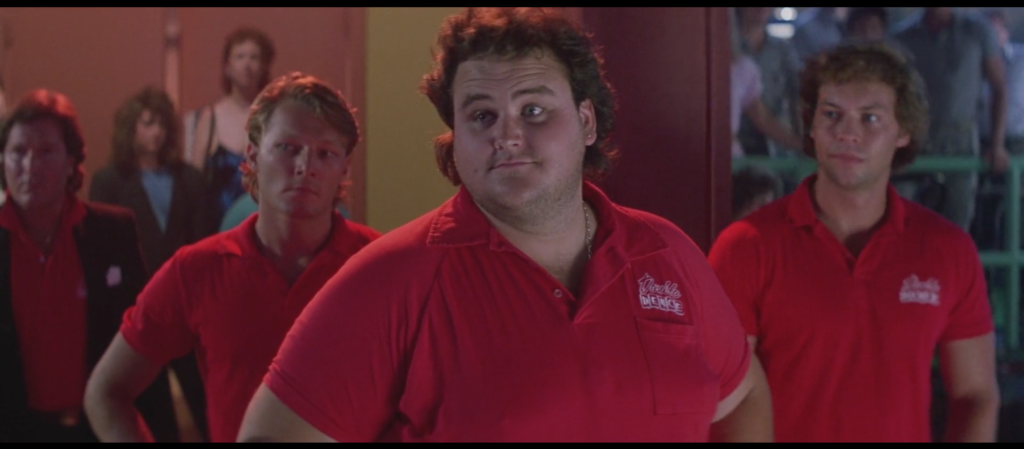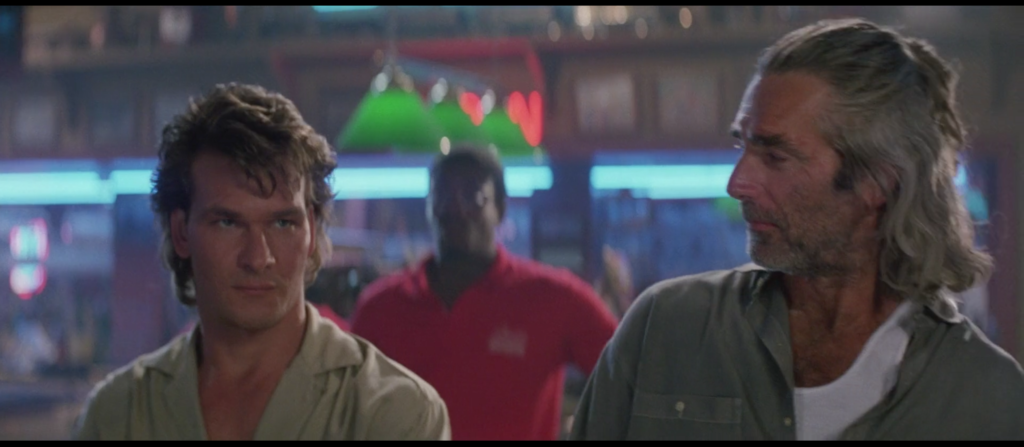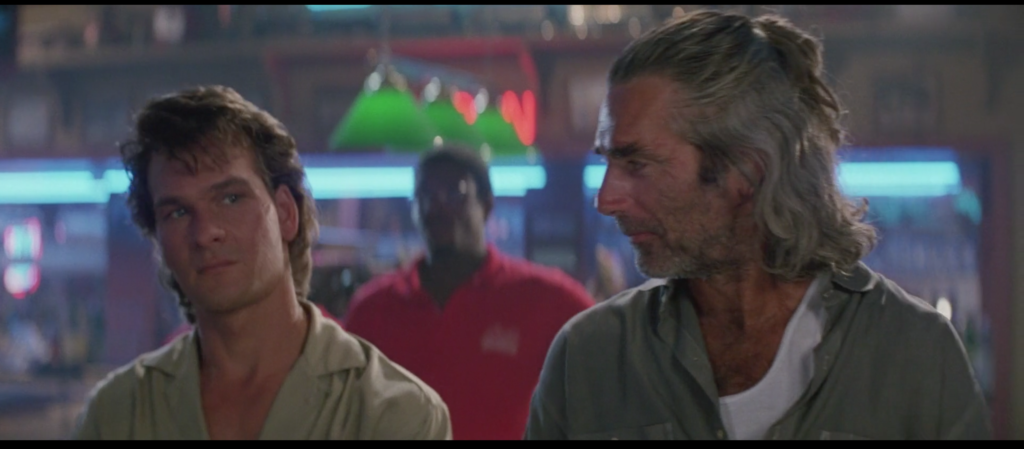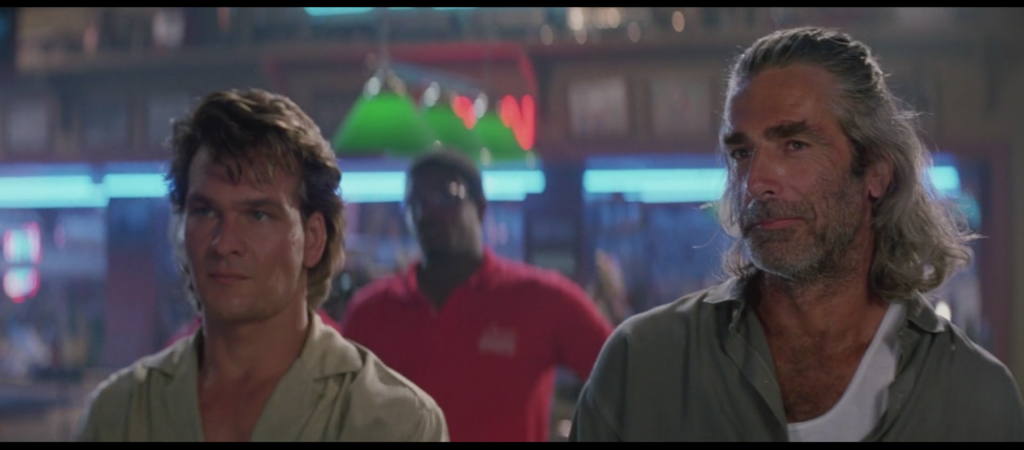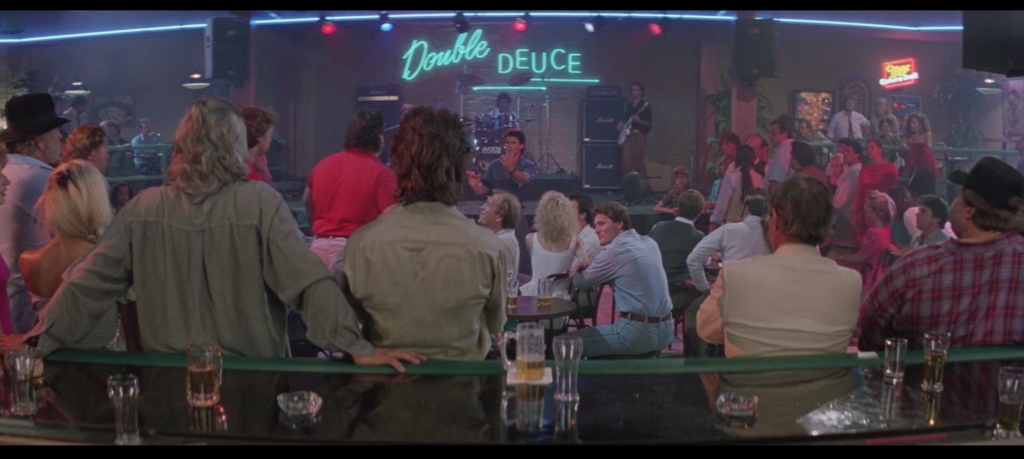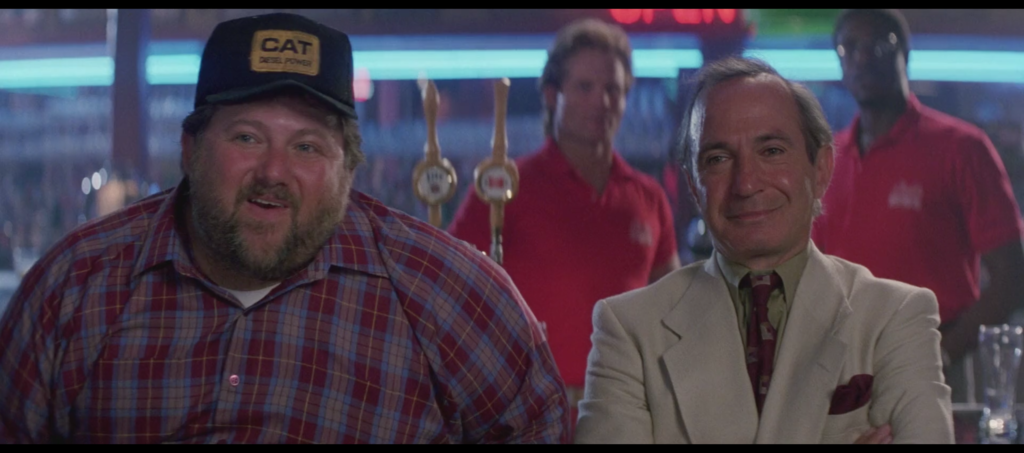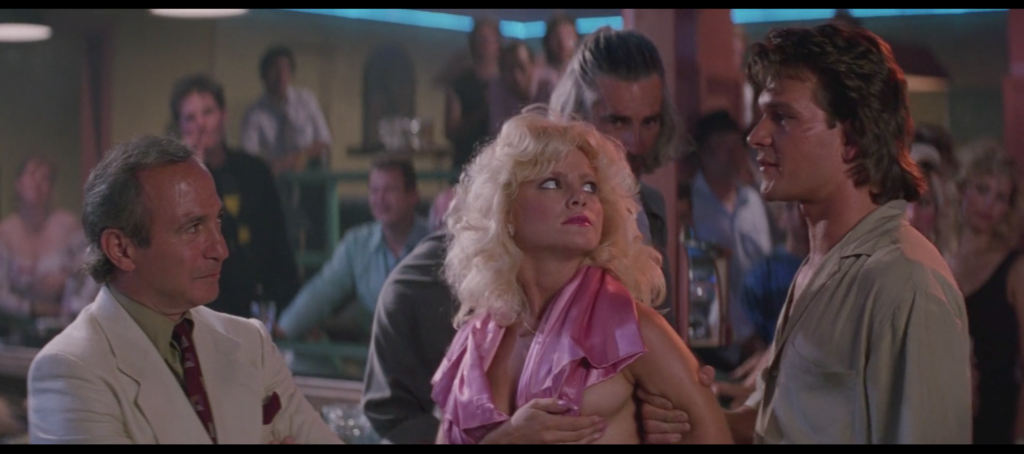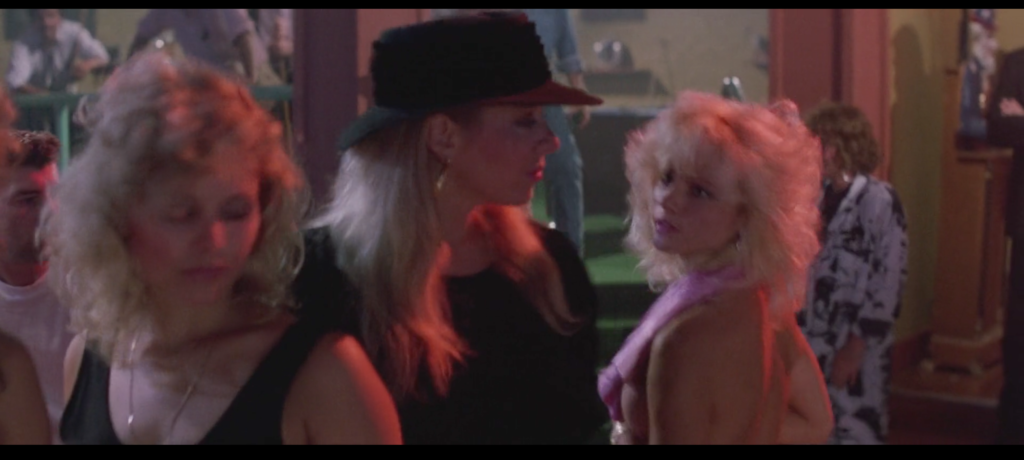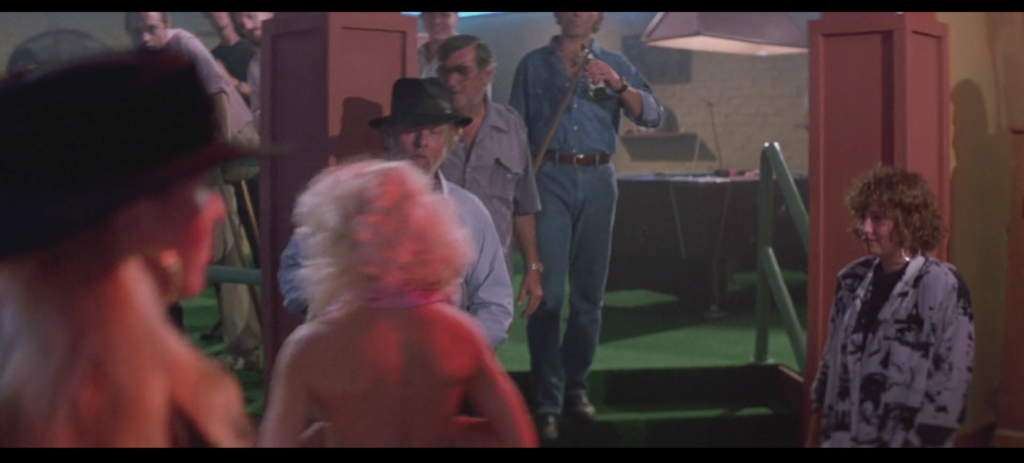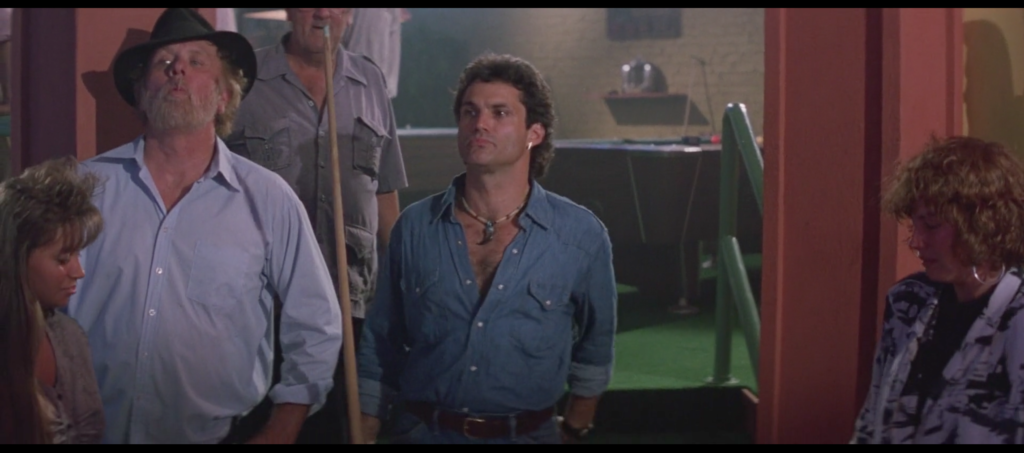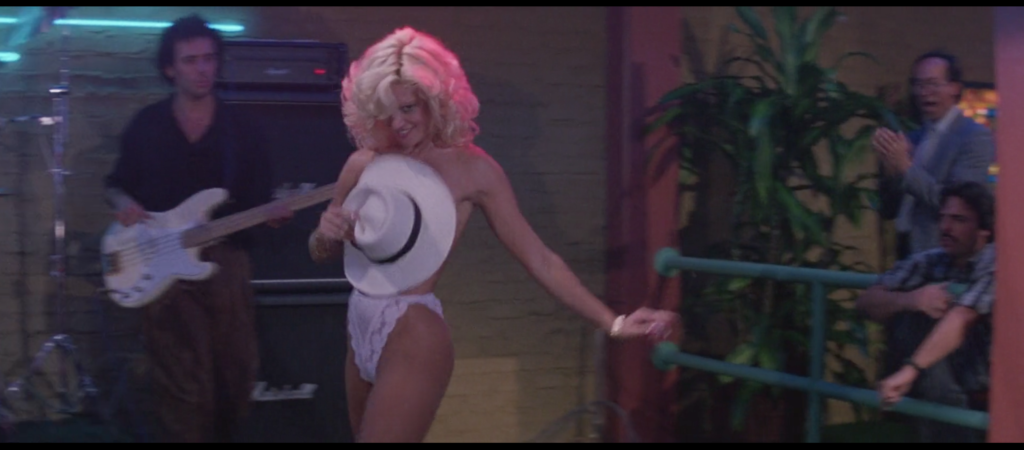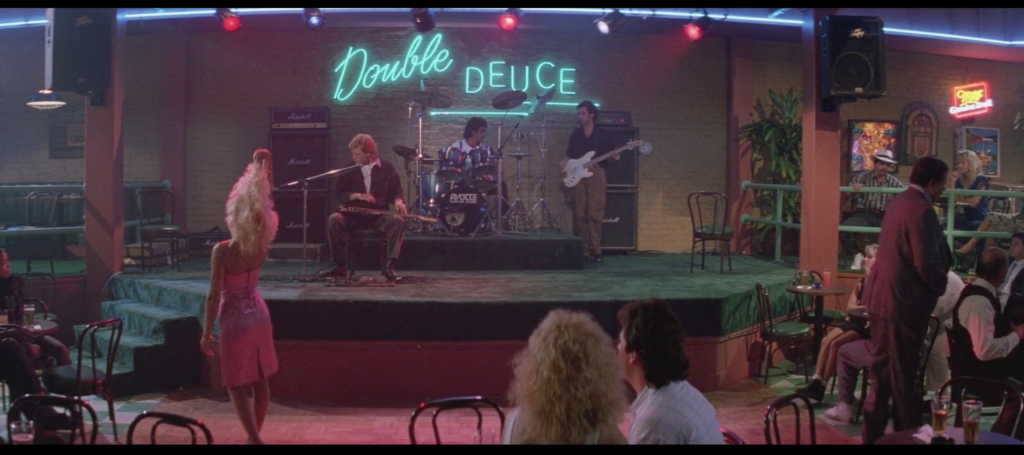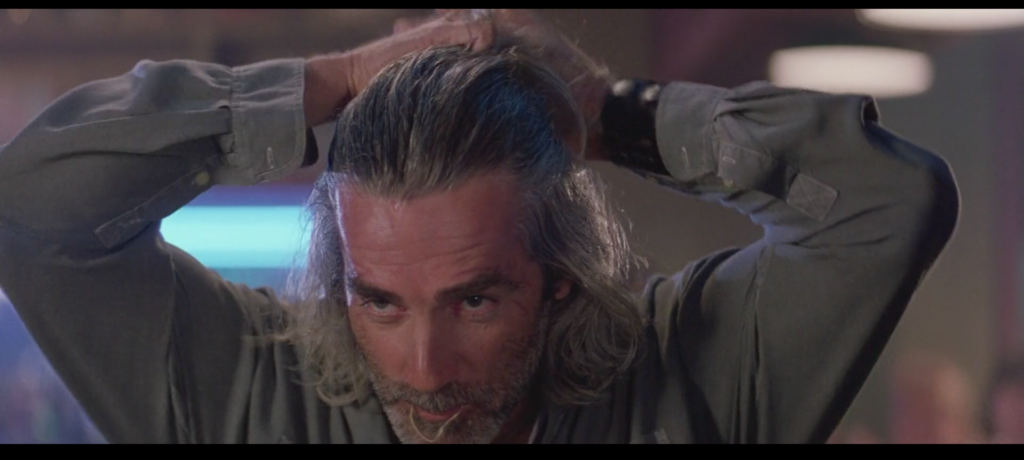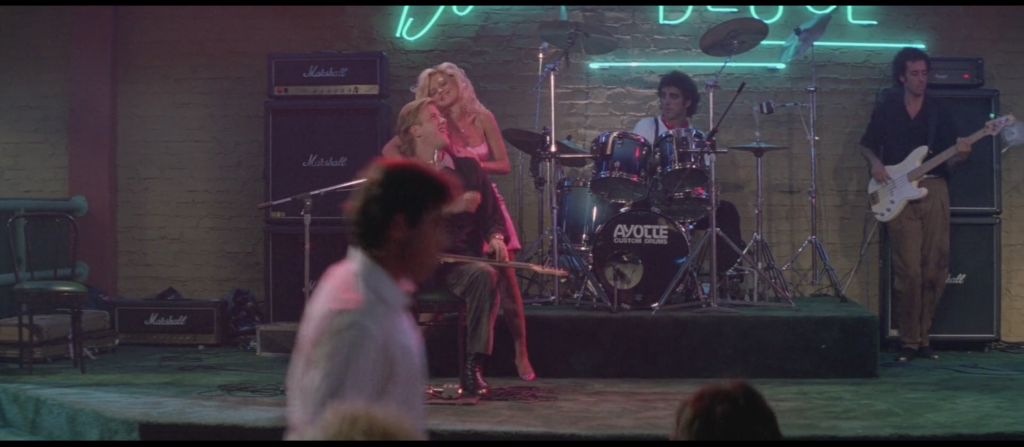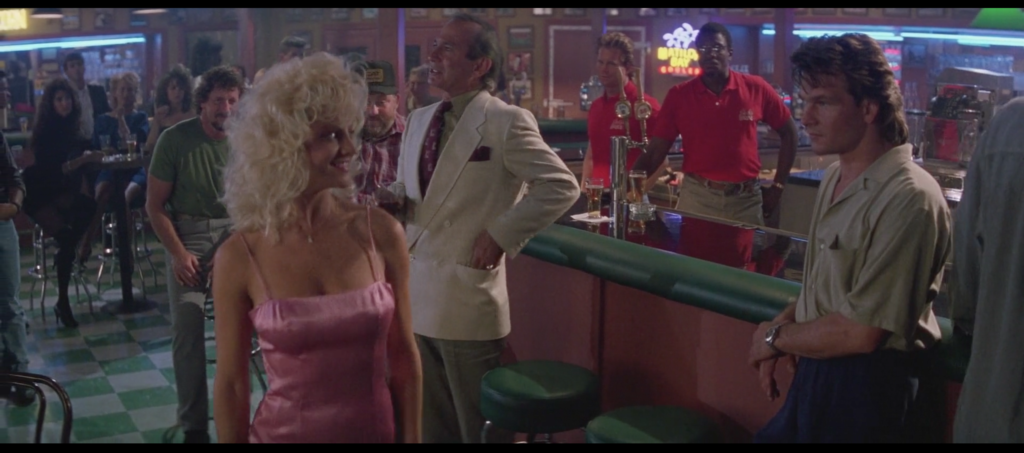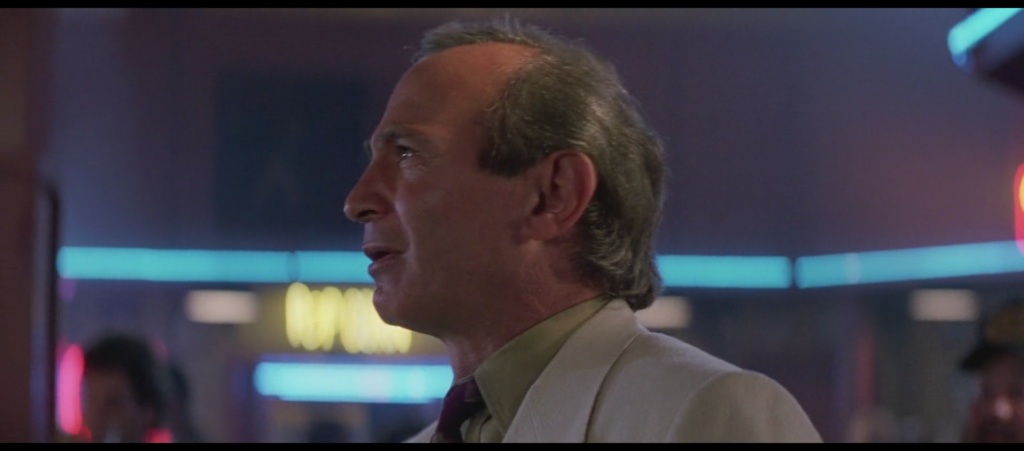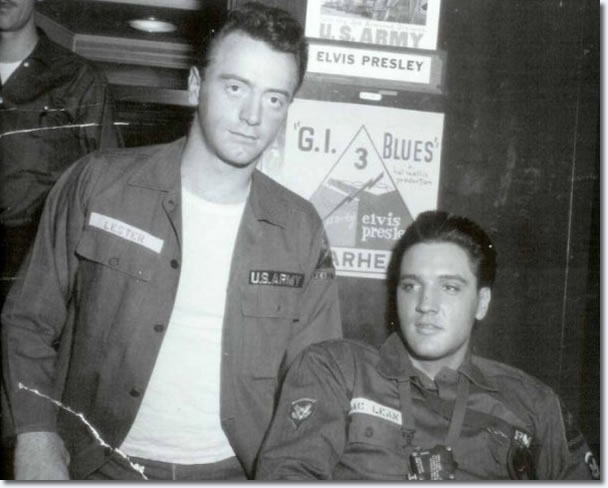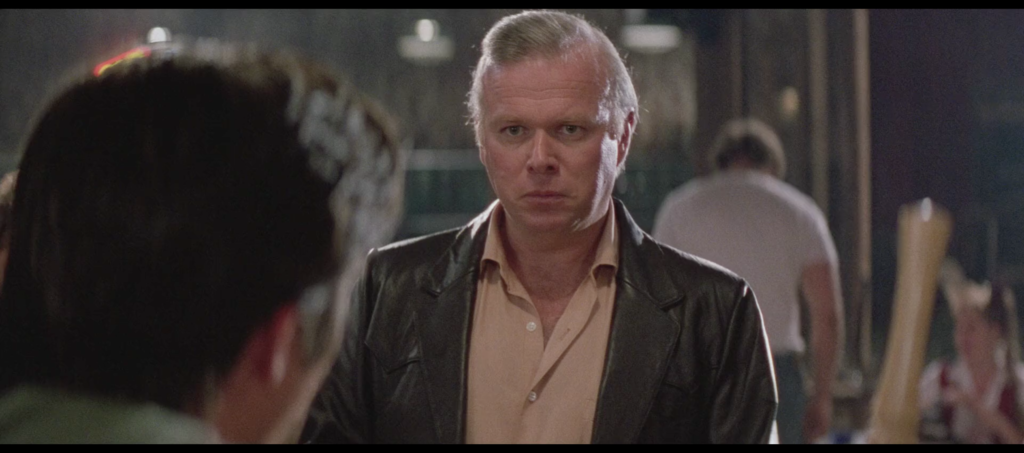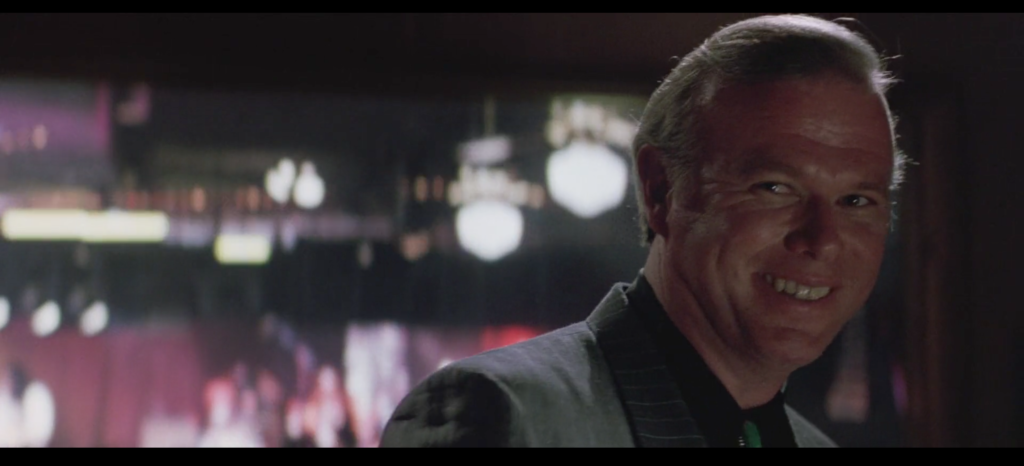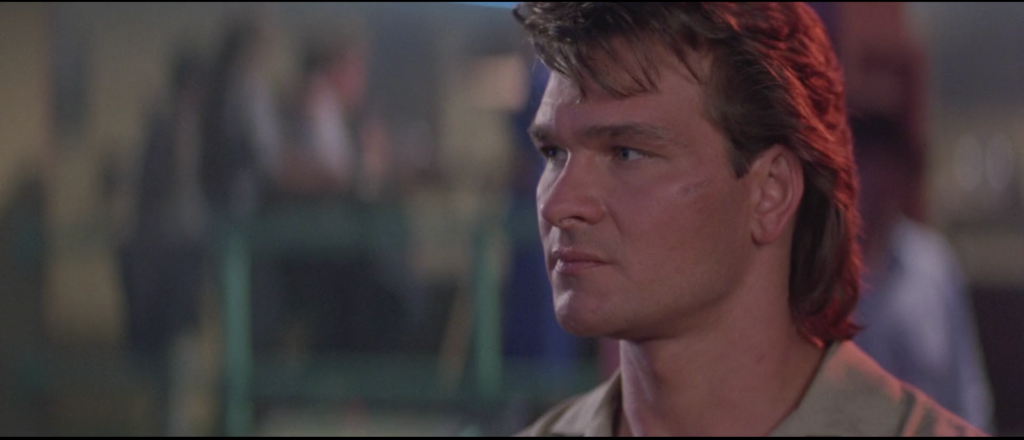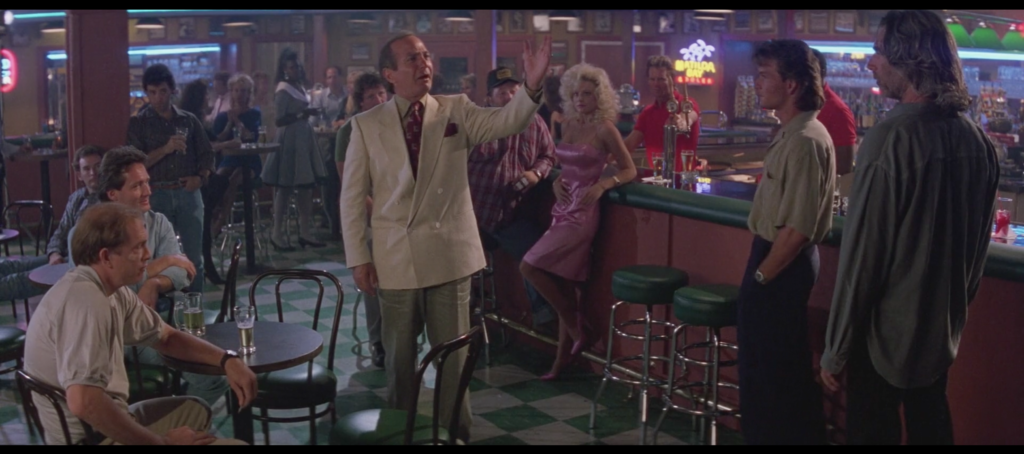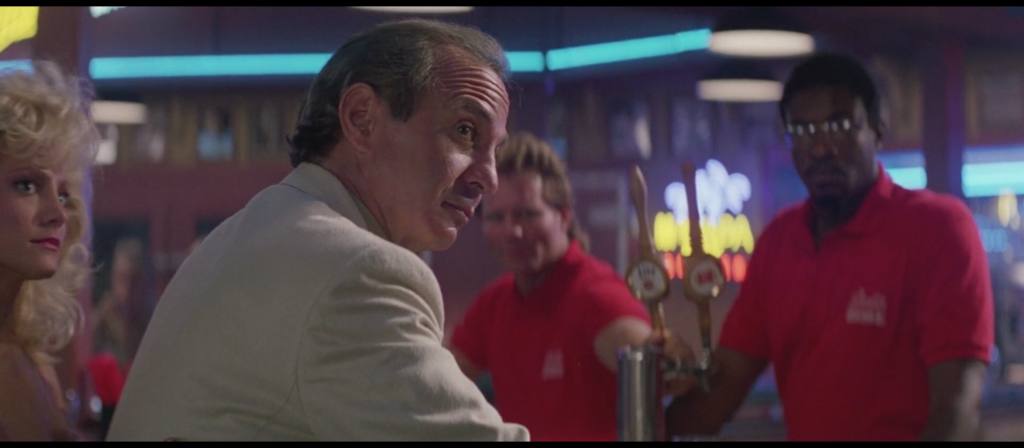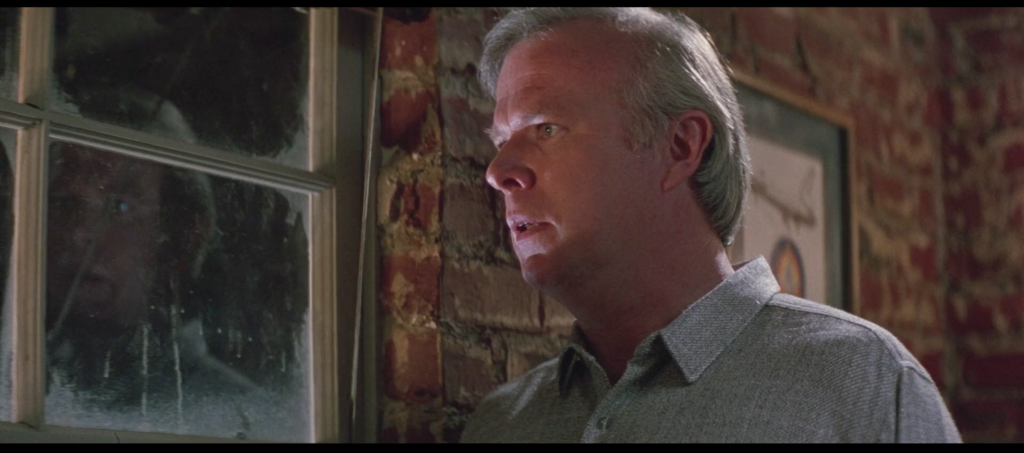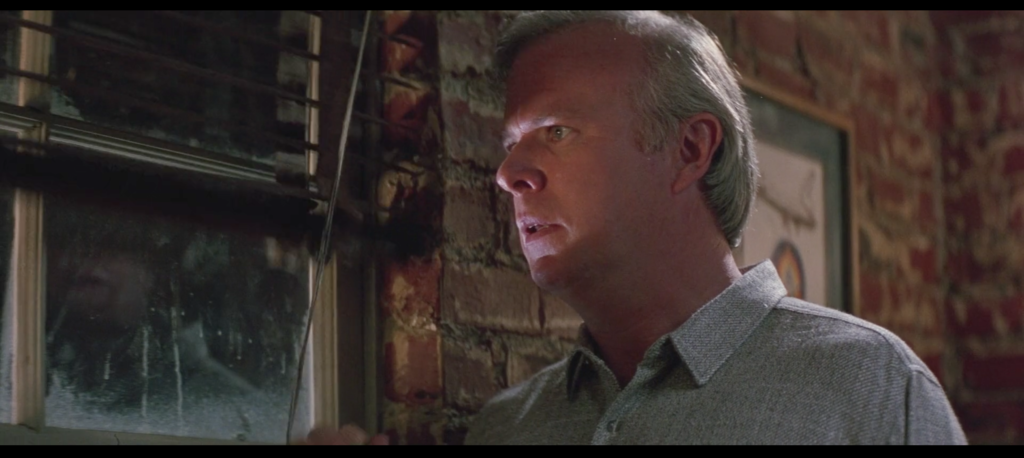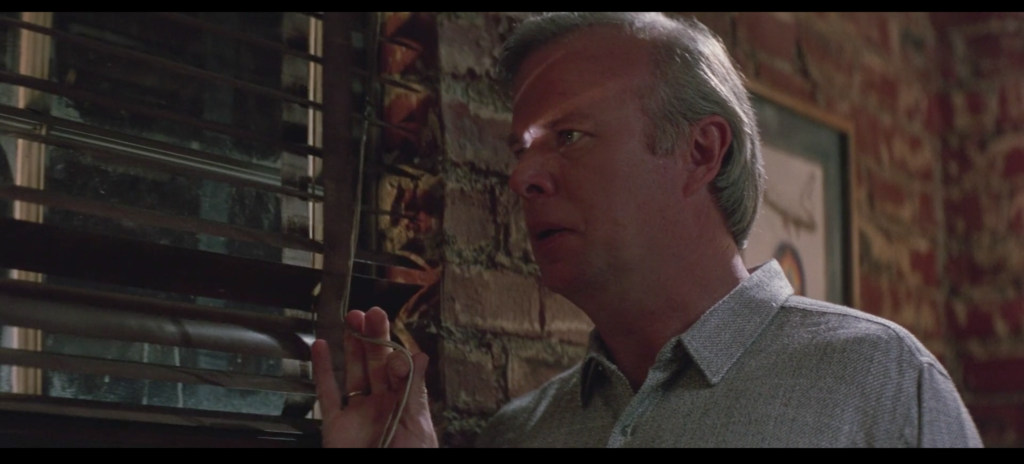Posts Tagged ‘the double deuce’
322. “Yo! Wake the fuck up!”
November 18, 2019“Sit the fuck down, have a beer, I’ll be back,” Dalton said to Wade just before departing to find Elizabeth. “Wesley wins, man. We’re outta here.” It’s then that Wade shoots him the “Attaboy, mijo” he will no doubt return to in his mind for years, even decades, to come. They’re just two men being men, swearing when it isn’t necessary, patting each other on the back. It’s who they are, even when one of them has been beaten half to death.
Dalton attempts to return to this pattern of dialogue when he comes back to the Double Deuce after his failure with the Doc. “Yo! Wake the fuck up! We’re outta here!” he says from across the room, smiling. This has alway struck me as the one genuinely superfluous f-bomb in the whole profane film. “Wake the fuck up” right away, without even a normal “wake up” first? It feels forced.
And it probably is. After all, in the guise of going along with his mentor’s wishes, Dalton is admitting to two massive failures: first, his failure to free the town of Jasper from Brad Wesley’s clutches, and second, his failure to convince Elizabeth to retreat alongside him. A nice blustery “fuck” where no “fuck” need be will paper over all of that just fine—indeed, it’s probably necessary to offset the repetition of “we’re outta here” from their previous conversation. Getting “outta here” is an admission of defeat, and that needs amelioration. The little friendly punch to the back Dalton gives Wade afterwards is of a piece with the cussword. Just guys bein’ dudes.
It falls apart quickly, though. “I said ‘one beer,’ señor,” Dalton says, still grinning, as he puts his hand on Wade’s arm to shake him awake. But there will be no awakening Wade Garrett, not now, not ever again.
320. Wounded Wade
November 16, 2019No sooner does Brad Wesley hang up on Dalton than Wade Garrett stumbles into the Double Deuce, wounded and winded. He’s not dead, not yet anyway, and it’s unclear whether the beating he says he sustained at the hands of three unnamed goons—none of which are members of the core team, who we will soon get a good look at and none of whom are injured in the slightest—is part of the coin-toss murder scheme Wesley just unveiled. Dalton certainly thinks it is, though: Since Wade isn’t dead, it stands to reason that Elizabeth is in grave danger, and indeed Wade says his assailants told him he was lucky. Dalton bounces out of there as quickly as he can, but not before telling Wade that Wesley wins, that they’re all going to skip town. “Attaboy, mijo,” Wade says, grinning. It’s the last thing Wade will ever say to him.
My own mentor, Tom Spurgeon, died this week. He was too young to go. The last thing he said to me was “Your writing is important to me!” So I can say, based on personal experience, that that “Attaboy, mijo” will lodge itself in Dalton’s heart. It’s there to stay.
263. “Same town, new story, huh, pal?”
September 20, 2019Wade Garrett may have taken a few too many shots to the head at this point, because I swear the thing he says to Dalton as Brad Wesley, Jimmy, and the rest of the gang saunter away makes no sense. “Same town, new story, huh, pal?” he asks, which…I’m sorry, what? Surely he means “New town, same story,” insofar as Dalton and Wade both talk non-stop about how they’ve seen it all before during their lives on the road. Unless he means that their fun time gallivanting with the Doc was one story and now this whole explosion/striptease/barfight scene is a different story entirely. And the beers Wade proposes at the end of this scene—are they a third story? Or would they be a continuation of the first story, the gallivanting-with-Doc story, given how integral beers were to that story? Or is it a continuation of the second story, the explosion/striptease/barfight story, since it takes place in the same location? Or did Sam Elliott flub this line and director Rowdy Herrington liked the sound of it so he kept it intact, like how in “Pass the Mic” Mike D rhymed “commercial” with “commercial” instead of “rehearsal” but it actually made the point he was making (“Everybody rapping like it’s a commercial / acting like life is a big commercial”) better if he delivered it incorrectly?
262. Parallels
September 19, 2019It’s not often that you encounter two shots of two diametrically opposed characters doing basically the same thing but in such different ways that you can understand everything there is to know about them both at a glance. It’s not often that you encounter a movie like Road House either, though. And here we have two future combatants in a life or death struggle, one arm pulled back, the other extended. The first is poised but serene, making a fist but with no intention to use it, shirtless, glistening, one with nature, wet with nature. The second is enraged, pointing at an enemy, singling him out, hungry for a kill, blocking out the blue light of the happy societal microcosm in which he is an interloper. Dalton and Jimmy, two sides of the same coin, the Batman and Joker of the JC Penney.
261. “Your ass is mine, boy”
September 18, 2019There’s a thin line between threat and come-on, and Road House spends its final reels dancing all over it. When Dalton steps in to stop Jimmy’s trouncing of Wade Garrett (and we love Wade, we love Wade Garrett, but this is a piss poor showing on the sensei’s part), he naturally makes a mortal enemy of his opposite number. Jimmy’s relationship with Dalton heretofore has been one of long, meaningful stares, without so much as a word exchanged. But the relationship has escalated, and a statement is called for. It’s almost an overture for the opera to follow, featuring all the major melodies: smug superiority, possessiveness, infantilization, a reference to Dalton’s ass. Jimmy and his biological father Brad Wesley (that’s my statement, no further questions) will return to these refrains over and over as the duel for Jasper heads toward its bloody conclusion. After much toil and tribulation, we will finally learn whose ass is whose.
259. The Suit
September 16, 2019At this late stage of the film, in this Time to Not Be Nice, great extras and background actors are largely a thing of the past. Wasn’t that Dalton’s entire raison d’être—to expunge the 40-year-old adolescents, felons, power drinkers, and trustees of modern chemistry—the Shirtless Man, the Foxworthy, the Mr. Clean, the Well-Endowed Wife? Other than their shared penchant for ostentatious hats the patrons of the new Double Deuce are a nondescript sort.
So it’s truly something special that the Suit stands out. That’s him getting shoved out of the way by Jack when the fire at Red’s break out, reacting with a stunned fervor usually reserved for members of the high school drama club who don’t get a speaking role but are pretty distracting in crowd scenes. That’s him again—sans jacket, now in a different color shirt and a vest—hooting and hollering at Denise’s dance like a man who’s never seen tits before, or at the very least has spent a long time in some sort of monastic community not of his own free will. And that’s him a third time, baying for blood as Jimmy whips the shit out of all comers.
A distinctive look. A face that’s expressive to the point of overdoing it, like a commedia dell’arte mask. The bald, browed pate of an angry Ugnaught. A three-piece suit at the white blues bar. The Suit, most extra of extras and last of a dying breed, has it all.
258. “YOU!”
September 15, 2019Jimmy Reno wants Wade Garrett. (Yes, his last name is Reno, as mentioned by Patrick Swayze in interview clips and as listed all over actor Marshall Teague’s CV. Yes, this could mean he is an illegitimate child of Brad Wesley born in Nevada, and Reno is his bastard name. No, I will not be taking further questions at this time.) Boy, does he ever. Enough to pole vault over Jack’s prone body onto the stage, just to be better seen and heard by his quarry. Once Wade responds, Jimmy jumps right back down again. He wanted to make a show of this. He wanted to ensure that Wade Garrett could not back out of this confrontation without losing face. He wanted the entire Double Deuce to watch him prepare to end a legend.
And Wade Garrett knows it, that’s the real asskicker. He and Dalton are off their game tonight, perhaps because of the traumatic destruction of a nearby business that’s still burning as this fight takes place, in front of the man who ordered the arson. The whole Double Deuce team is off its game, perhaps, otherwise the numbers would have worked in Jack and Hank and Younger’s favor. Instead, they’ve been laid out all over the dance floor while Wade and Dalton tussle with lesser goons we’ve never seen before nor will ever see again.
(Yes, one of them is wearing a large black hat. Yes, so is a woman visible in the background. Yes, I continue to be perplexed by the presence of all those hats. Again, I will not be taking further questions at this time.)
This is the moment Jimmy chooses to call out Wade Garrett. He vaults onto the stage. He turns. He points with the force of a kung fu strike. He bellows a single word, a single syllable: “YOU!” And Wade Garrett knows the time to be tested has come.
257. Ernie inaction -> Ernie in action
September 14, 2019You’re not supposed to see Keith David throw a punch in Road House. His part was all but excised from the film due to running-time concerns. His sole line of dialogue is to warn Tilghman that the whiskey’s running low. He’s one of the great action stars of the ’80s and the most action you see from him is handing Dalton a phone.
But soft! What light from yonder barroom breaks? While Dalton is polishing off one of the many cut-rate Brad Wesley goons—about whom more later—who infiltrated the Double Deuce during Red Webster’s fire alongside the usual suspects, there in the background, his fists obscured by a pillar, is one Ernie Bass, bartender-warrior, throwing hands with some dimp with a mustache and a dress shirt with no tie. Not the most formidable opponent, perhaps, not even in a world that contains O’Connor. But who knows what chaos the butterfly effect could have caused had the character played by Keith David not stepped into that particular breach?
And what about O’Connor and Tinker and Ketcham and Morgan, the traditional goons who accompanied Brad Wesley to the bar on this fateful night? Jack, Hank, and Younger don’t take care of them; they’re all too busy getting smacked in the skull with a pool cue by Jimmy. Wade Garrett doesn’t take care of them; he fights lesser goons until he’s summoned to a one-on-one bout with Jimmy in which he is badly outclassed. (It breaks your heart to see, truly it does.) Dalton doesn’t take care of them; he too is to busy fighting goonlets to do so, and then he intervenes in the Jimmy/Wade fight just before Brad Wesley calls the whole thing off.
There’s every reason to believe that while our attention is elsewhere—as indeed it is even in the few frames where Ernie is visibly fighting, our eyes drawn to the foreground action involving Dalton and a chibi-goon—Ernie wrecks shop, clearing out Wesley’s Slab Four all on his own. Keith David vs. Terry Funk…ah, what might have been. Our imaginations must fill the gap.
256. The Childlike Jimmy
September 13, 2019When Jimmy finally enters the fray, after three quarters of the film have elapsed, he does so wielding a pool cue. In this he is living the dream of every child who ever grabbed a hockey stick or whiffle ball bat or cardboard wrapping-paper tube and fancied themself a swordfighter, a Jedi, a Robin Hood, a Zorro, a Knight of the Round Table. He’s playing a game with violence.
Of all Brad Wesley’s “boys,” to use his preferred term, Jimmy is his clear favorite. It has been the position of this series that this stands to reason, because Jimmy is Brad Wesley’s bastard son. Once estranged, they are now thick as thieves. The older man, I suspect, yearns less to make up for lost time than to, in his words, “gather unto me what is mine.” A Brad Wesley who discovers his by-blow is a Brad Wesley who instantly dedicates himself to Brad Wesleyifing that product of his loins—who will see himself in all his offspring’s most valued qualities.
But by the same token, Jimmy would look to be the son Brad Wesley never knew he had. That means obedience. That means mimicry—the same sly smile, the same eyes sparkling with malignant good cheer. And that means, on some level, behaving as a child would behave. Yes, Jimmy is about to cut through Dalton’s men like knife cutting through cake. But he’ll do so with a toy in his hand.
255. Faces
September 12, 2019254. “If you’re gonna have a pet, keep it on a leash”
September 11, 2019If you’ve read all 253 Pain Don’t Hurt entries to date you’ll agree I’m no fan of Dalton’s response to Denise’s striptease. His condescension, if not outright cruelty, to a sex worker and abuse survivor is unconscionable given his philosophical mandate to be nice until it’s time to not be nice. Is this, is the removal of Denise from the stage and the presentation of Denise to her abuser, really such a time?
All I can say in Dalton’s defense is that this is a rare case of seeing the forest but neglecting the trees. The destruction of Red Webster’s Auto Parts marks a major escalation of hostilities in the war between Dalton and Brad Wesley. That would make this time to not be nice, barring any further considerations; Dalton fails to realize that Denise and her plight are such further considerations. Moreover, the aforementioned war has been waged entirely, on Wesley’s side, by third parties, namely his goons. Dalton correctly locates Denise’s dance in the context of Wesleyan aggression, however weird that aggression might be in this case; he treats her as he might treat a goon, albeit one against which he does not want to raise his hand, missing the obvious distinctions between Denise and the Tinkers and O’Connors of the world.
It should be noted here that at one point Dalton cracks a wry smile at Denise when she’s beaming at him from the stage, but while that smile might be seen to indicate warmth towards her, it’s not at all dissimilar from the grins he occasionally flashes at the likes of Ketcham or Pat McGurn when they start to get up in his business. To Dalton, a goon is a goon is a goon.
But if he is guilty of making this categorical error, he is by no means alone. “If you’re gonna have a pet,” he tells Wesley while gripping Denise roughly by the arm, “keep it on a leash.”
Denise yanks her arm away.
“You’re right,” Wesley says, conceding the point.
Then—as if summoning a pet—he calls this man’s name.
253. Hats Off Revisited
September 10, 2019The patrons of the Double Deuce love their hats, yes they do. But perhaps no one loves their hat quite so much as the mustachioed gentlemen in the striped short-sleeved shirt visible on the right, as it transitions from headwear to a stylish blouse in the hands of Denise. To her I can only say kudos for this innovative application of Road House‘s most ostentatious and inexplicable fashion accessory.
The interesting thing here, though, is that this is not one of the black hats visible earlier in the film, but a white one. White hats are the symbol of moral rectitude in the Western, the genre to which Road House is most directly indebted. Here, Denise toys with the white hat before dispensing with it altogether. It’s her way of thumbing her nose at the good guys and their rules and their holier-than-thou attitudes. It does the heart good to see her thus empowered. Given Dalton’s behavior a few seconds from now, she deserves this all too brief allowance.
251. Battle stations
September 8, 2019As Denise readies her hostile takeover of the Double Deuce’s stage, she tousles her hair up, up, up, past its already significant poofiness to previously untold-of heights. She’s feeling herself, literally. Hers is the mane of a wild thing, set loose in the Deuce, another runner in the night. She’s sending a message about the dance to come without so much as a single gyration. It’s going to make your hair stand on end, and more besides.
As Wade Garrett watches Denise dance, he too preps himself by running his hands through his hair. But in his case, he ties it back in a half-ponytail, swept back and oddly severe, like a warrior in a fantasy television series. Somehow, his superior cooler-sense in action perhaps, he senses that there will be blood when Denise’s dance is through, and it’s better to fight without your greasy gray locks obscuring your vision and distracting you. Out of sight, out of mind.
Both of these remarkable individuals play a key part in what’s to come—the start of the final round of hostilities, the beginning of the end. It’s gonna get hairy.
250. Whose side are you on?
September 7, 2019There’s something a bit unnerving about the alacrity with which Cody and the boys acquiesce to Brad Wesley’s command that they “play something with balls.” Surely one of Dalton’s oldest and dearest friends could be counted upon to reject the orders of the man’s nemesis, even if the end result of following orders is a beautiful woman taking her clothes off to the rhythm of “Hoochie Coochie Man,” right? But no, there they are, rocking out with their proverbial cocks out, smiling and seeming to enjoy every minute of their shared performance. True, Cody can’t see what Denise is doing, but from the hoots and hollers of the audience it doesn’t take Hercule Poirot to deduce what’s happening up there on the stage. Cody even gets a happy little caress out of the deal for himself, as you can see above. Is it as simple as “the show must go on”? Does Cody have an ulterior motive? Are he and his curly-haired compatriots simply being Horny On Main? I don’t have an answer to this one, I’m afraid. Perhaps that’s just one of the ways in which this scene signals the start of the Bad Times to come.
249. “Of course you can dance, honey”
September 6, 2019And you thought the dynamic between Dalton, Doc, and Wade Garrett was odd. Fresh from homophobically insulting Red Webster, defending his protection racket as an act of civic pride, and offering to buy the fire department a round (“Well, with a fire like that, nothing they could do,” he reasons), Brad Wesley drops a non sequitur on the assembled staff and patrons of the Double Deuce: “Of course you can dance, honey,” he croaks.
The thing is? No one has asked him if they can dance. So unless there was some inaudible exchange, unless Denise can speak at a pitch too high or too low for non–Brad Wesley humans to hear, this isn’t acquiescence to an existing request. This is an order. It may be couched in courtesy, but it’s still a command.
Based on what we’ve seen of Wesley and Denise’s relationship, she’s probably used to being ordered around. She certainly knows what will happen if she disobeys. But look at her face as she glides past Dalton on her way to the stage, for what will be a show-stopping striptease. She’s beaming. She’s staring right at Dalton and she’s hitting him with a smile bright enough to cast shadows.
As well she might. We know she’s attracted to Dalton. We know that she caught a beating for acting on that attraction, unsuccessful though she may have been. We know that the likelihood of her being free to come on to Dalton again is nil. But here’s her chance to shake her moneymaker for Dalton’s enjoyment—not just under Brad Wesley’s nose, but at Brad Wesley’s behest.
He may think having Denise dance is a masculine power trip, a way to lord his potency over his enemy while simultaneously threatening the rules and order by which the Double Deuce runs. She may be getting something else out of it entirely. Perhaps that’s the best way to understand what is about to occur—and perhaps it’s the most damning thing about how Dalton responds.
247. “Play something, Elvis!” or wheels within wheels
September 4, 2019“It’s like a morgue in here,” observes Brad Wesley of the mood in the Double Deuce. When you blow up a local business it’s hard to blame the locals for failing to be festive, but that’s Brad Wesley for you, a man who muscles car dealers for protection money by day and throws shit-happens-when-you-party-naked moonlight swims for his goons by night. Hell, he swerves all over the road by day too, so in a sense the party never stops.
Thus, his command to the band: “Play something, Elvis!” He’s looking right at all three members of the Jeff Healey Band when he says this. You’d be hard pressed to line up three white men who resemble Elvis less, but one gets the sense that Brad Wesley has, as so many older men do, calcified ideas of what constitutes a good time in every respect, music included. A rock and roll singer? Elvis. An actor? I’m guessing John Wayne. I wouldn’t be surprised if Wesley’s entire pop-culture cosmology consists solely of people Public Enemy warned us about in “Fight the Power,” “the Power” excluded of course.
Just after his command, which goes unheeded for a few moments, Wesley makes another proclamation: He tells no one in particular to “Get those firemen in here—I want to buy them a drink!” Seems like the least he can do to pay them back for the arson.
But for Wesley, the blame rests squarely on the shoulders of the arsonee, not the arsoner. “Risking their lives for that no-good faggot draft dodger Red Webster” is how he describes the firefighters’ duty that grim night, opening up alllllll kinds of yeeesh-inducing questions about Wesley’s politics, none of which have happy answers. Note that Wesley’s subsequently expressed complaint about Red is that he doesn’t chip in to improve the town like everyone else; knuckling under to Brad Wesley’s protection scheme is the traditionally heterosexual thing to do, apparently.
Red, you’ll recall, moved to Jasper twenty years ago, because he got married to an ugly woman from the area and fell in love with the place even as she fell out of love with him. Actor Red West (yep) was born in 1936, and assuming Red Webster is the same age that would make him 32 or 33 years old in 1969 when the marriage took place—well past the age of conscription, even given that the marriage exemption had been lifted by LBJ some years prior. At any rate, Jasper, Missouri is not exactly Canada, and it seems unlikely that Red had connections who could make a bone-spur deferment materialize for him even if his number came up.
What about Korea, then? We know from Brad Wesley’s big breakfast monologue that he served in that hot Cold War conflict, and from that we could assume he’d take especial umbrage at anyone who managed to weasel out of the service. But Red would only have been in his mid-teens during the Korean War, again placing him out of range of the draft.
All that remains to us, then, is peacetime conscription in the interwar years. And who was the most famous draftee during that time period? A man named Elvis Presley.
And who was in Elvis’s entourage, very much in real life? His old high-school chum Red West. Who was drafted too—and appeared in G.I. Blues, a movie in which he and Elvis were soldiers.
Play something, Elvis. “Reveille,” perhaps.
246. Blowback
September 3, 2019One of the several hypotheticals Pain Don’t Hurt has entertained at length is my belief that Frank Tilghman is the Emperor Palpatine figure of the story, the secret puppet master behind Brad Wesley who engineered the conflict with Dalton and brought it to a head by orchestrating the murder of Wesley and his associates when they were no longer of any use. Another theory Pain Don’t Hurt has espoused is that Frank Tilghman and Pat McGurn, Brad Wesley’s nephew and Double Deuce bartender, were once romantically involved and that he is therefore and visibly upset about having to fire him. They seem mutually exclusive propositions.
But this is true only if you believe that Tilghman is not just sinister but supernatural. No one can control for all variables, and it’s entirely possible that Frank’s Pat-shaped blind spot prevented him from thinking through the consequences of hiring a man to keep everything on the straight and narrow when your ex-lover is a transparent thief and ringer for the very stooge whose downfall you’re plotting. It’s also possible that Frank knew full well that Dalton would exile Pat from the Double Deuce, and that he deemed this an acceptable loss in service of the larger plan. Indeed, he could have considered it a form of alibi—after all, what kind of man would fire his own ex, for whom he clearly still had feelings, if he himself weren’t morally unimpeachable?
What kind of man, indeed.
245. The go-ahead
September 2, 2019Brad Wesley has the people of Jasper, Missouri so shook that bartenders ask for permission before serving him, as if the act of pouring a shot for Brad Wesley is like letting a highly inebriated man pull a knife on you for trying to stop his girlfriend from dancing on a table. The bartenders, Ernie and Nameless, look straight to Dalton when Wesley makes his request, and fulfill it when and only when Dalton gives them an affirmative head-nod signal. Suddenly even the bartenders are acting like bouncers on the Dalton Path. Recall that it’s not their job to know when it’s time to not be nice; they won’t know, Dalton will tell them. As there are still a few grains left in the hourglass at this particular moment, Wesley gets his drink.
Given what is about to unfold one wonders if Dalton should have 86’d him right then and there. The numbers game appears—and I stress appears, because Wesley is holding several aces up his sleeve, along with a Jimmy-shaped Joker—to be even, which is to say it works in Dalton’s favor. Assuming Wesley to be a non-combatant, arrayed against Dalton, Wade, Jack, Hank, and Younger we can see Morgan, O’Connor, Tinker, and Ketcham, all of whom have fallen in Double Deuce–based combat already, in O’Connor’s case twice. (Maybe Wesley was right about him being a weak bleeder after all.) And since the bar is largely empty, with most of the crowd still outside watching the fire, the risk to civilians in the event of a brawl would be minimal.
But Dalton is reluctant to start something unless and until his opponent displays violent intent. As we will see, Wesley’s initial gambit is disruption rather than destruction—still a bounceable event, but not yet grounds for expulsion. I’ve never said this once during the course of this project but I’ll by-god quote it now: Man’s gotta have a code.
244. Infiltration
September 1, 2019The fox is in the henhouse. The rats are in the cellar. The weasels are in the corn. Using the conveniently timed explosion of Red Webster’s Auto Parts as cover, a large party led by Mr. Brad Wesley has infiltrated the Double Deuce. They expect the same things everyone does when they go to the bar: some drinks, some dancing, a little idle chatter. But they are arsonists and hired thugs, so naturally they’re not the sort of people who’d be allowed in the bar. Indeed, Morgan, Tinker, O’Connor, and Ketchum have all been expelled from the Double Deuce, bodily so in most cases. Only by distracting Dalton, Wade Garrett, and all the bouncers with the fireball outside could they even get in.
The presence of Wesley and his cronies is all but an admission of guilt, but it’s more than that. It’s a sign that Dalton’s control is slipping. He couldn’t stop these goons from getting in. As we’ll soon see, he doesn’t succeed in getting them out, either. Brad Wesley is calling, ordering, and firing the shots here, in that order.
The time to not be nice is here.
243. No one saw a thing
August 31, 2019It’s okay. It’s okay, Frank. You’re okay. Just calm down. Everything went according to plan. Wesley did just what he told you he would. No one was injured. You still need Red for Phase 5, and this gets him one step closer. You need Dalton too, and he didn’t get wounded in the blast—despite his best efforts, the crazy sonofabitch. Don’t be nervous, don’t be scared. No one can connect you, and even if they could, no one would believe it. Wesley will be here any minute now with his men—who’d believe he’d show up to intimidate his own boss? Nobody, that’s who. Your alibi is rock solid. But quick, lower the blinds, just in case anyone looks up and sees. Put that poker face back on. Then practice looking concerned, not worried, concerned. How could such a thing happen? Oh, Red, I’m so sorry for your blah blah blah, that kind of thing. They’ll eat it up, the saps. They always have. They always do. But from now on, let’s steer clear of these…incidents. Strodenmire is next on the list, yes. Best not to show up to Wagon Days, then. Let Wesley handle it on his own. He won’t mind, the sad sociopathic bastard. And by the time he notices the money’s been diverted from his account…Phase 5. No one will ever be the wiser. Calm down, Frank. Have another drink or something. Just gotta keep telling yourself, I did it. I pulled it off. Nobody knows anything. No one saw a thing that I didn’t want shown. Everything is proceeding as I have foreseen.

